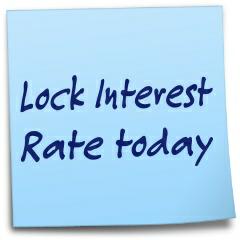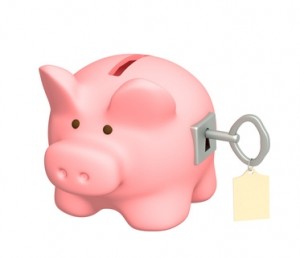 Understanding Mortgage Rate Locks
Understanding Mortgage Rate Locks
A mortgage rate lock is a lender’s promise to hold an interest rate for a specific time.
Of course, when you are looking for a mortgage, most want to make sure they are getting themselves the best deal possible. In evaluating various proposals from different lenders, you should look at the interest rates, the points being charged, and the closing costs.
One of the considerations when applying for a home loan is when to actually lock in the quoted interest rate the lender is giving you.
You gamble with your future loan payment when you don’t lock the rate immediately. Unless you are a gambler and can deal with a rate bump, the best time to lock in a rate is right away!
Getting the best home loan terms sometimes is luck, and other times it’s being educated. Of course, it can be a little of both.
Considerations When Locking a Mortgage Interest Rate
The three considerations when looking at locking in your interest rate are:
- Interest Rate
- Points
- Length of the lock
It is important to note that locking in on a rate does not commit the borrower to go through with the loan. The interest rate lock eliminates the borrower’s risk of being open to market fluctuations.
As a home buyer, when your qualifications are tight, the last thing you want to do is find out your rate has increased from 5.5% to 5 7/8%.
An interest rate increase like that for some folks could be the difference between eating a nice fillet Mignon or settling for spaghetti more often than you want to.
When a mortgage company or bank permits an extended rate lock-in period, the borrower will usually see either a higher interest rate or more points associated with the loan.
The lender does this to minimize its exposure to market risk. The borrower pays the lender to take on this risk in the form of a higher rate of more points.
Example Rate Lock
For example, a 30-day rate lock commitment may cost the borrower one-half point, while a 60-day rate lock could be double that or one full point.
If a borrower needed an extended lock period but did not want to pay points, the lender could increase the interest rate instead.
In this example, typically, a 60-day lock would have a higher interest rate than a 30-day rate lock. A point, by the way, is 1% of the mortgage amount.
So if you borrow $200,000, one point would equal $2000.00. Not cheap, but sometimes this avenue is taken if you are building a new home and think there could be construction delays.
Paying the extra point would be security to keep a reasonable interest rate.
Another reason it is usually best to lock in a mortgage rate immediately because if rates come down substantially, most lenders are willing to renegotiate the rate. Why are lenders willing to do this? The answer is simple: they do not want to lose your business to someone else!
What Happens if The Lock-in Period Expires?

If your lock-in period expires, you could lose the interest rate and the number of points you had locked in.
In this situation, most often, lenders will give you a new loan quote based on the prevailing interest rate and points, which could be higher due to market conditions.
As a borrower, you should watch what has been happening in the mortgage market. Sometimes, mortgage rates stay constant for a very long time.
On the flip side, there are times when market rates can be very volatile, even daily. Knowing what is going on when you are getting your mortgage could play an essential role in your decision.
Get Your Rate Lock in Writing From The Mortgage Lender
When you lock your interest rate, make sure you get it in writing from the lender. A verbal loan commitment is worthless. There have been times over my Real Estate career when buyers have fought with their lenders because they told them they wanted to lock a rate, yet the mortgage broker did not act on it.
Make sure you get documentation that the loan has been locked! Also, remember that one of your goals should be to time the rate lock so that you leave yourself ample time to get to closing without having the rate lock expire.
One last point that should be clear about locking an interest rate is watching the news and hearing that the Federal Funds Rate is dropping and assuming that 30-year fixed-rate mortgages will also be dropping. This could not be further from the truth!
The Federal Funds Rate May Not Be Important
There is a big disconnect between the Federal Funds Rate and fixed-rate mortgage instruments. In fact, many times when the Federal Funds Rate has dropped, long-term interest rates rise.
The Federal Funds Rate is more closely tied to the adjustable rate mortgage. For a complete explanation of how it works, see The Federal Funds Rate V.S. Fixed Rate Mortgages. Don’t make an uninformed rate lock decision based on rising or dropping Federal Funds Rate.
As a borrower getting a home loan, one of the other important considerations to weigh is when it makes sense to pay mortgage points. For an explanation, see when to pay points on a mortgage loan.
Other related mortgage articles:
Final Thoughts
Knowing when to lock your mortgage interest rate is essential when buying or refinancing a home. Hopefully, you now have some better insights on when to get it done.
About the author: Bill Gassett, a nationally recognized leader in his field, provided the above information on locking a mortgage rate. Bill can be reached via email at billgassett@remaxexec.com or by phone at 508-625-0191. Bill has helped people move in and out of many Metrowest towns for the last 36+ Years.
Are you thinking of selling your home? I am passionate about real estate and love sharing my marketing expertise!
I service Real Estate Sales in the following Metrowest MA towns: Ashland, Bellingham, Douglas, Framingham, Franklin, Grafton, Holliston, Hopkinton, Hopedale, Medway, Mendon, Milford, Millbury, Millville, Northborough, Northbridge, Shrewsbury, Southborough, Sutton, Wayland, Westborough, Whitinsville, Worcester, Upton, and Uxbridge MA.













Lew thanks for the link on locking a mortgage interest rate.
Hi, Bill,
Great article.
I know today most lenders require that the borrower sign a paper that they have agreed to the interest rate and the locking period. And with today’s new GFE, lenders are being even more careful.
I’m glad to see our industry being much more professional.
Betsy
So timing is essential when trying to decide when to lock too… so check with the lender. The longer the lock, the higher your points so it makes sense to ask if you have 30, 45 or 60 day pricing.
Also, locking in might just help you sleep better!
I want to thank the blogger very much not only for this post but also for his all previous efforts. I found this Massachusetts Real Estate blog to be extremely interesting. I will be coming back to massrealestatenews.com for more information.
Bill, great article… thanks for the info on when to lock an interest rate. I am constantly learning from you, which for a new agent, is fantastic. Keep up the great work!
Thanks Chris I appreciate the compliments! I hope things are going well for you.
Bill- Great article and awesome to see someone talking about the Fed Funds Rate…every time this comes up we get bombarded with requests to “float”. Now I can point them to your article. Also, getting it in writing (lock confirmation) is HUGE! thanks for the great blog..
Great Blog!. Thanks for sharing.
I am shopping for loans. I know I will not be able to move into my new home before February 2012. It is October 2011 now. My question is, when should I lock my rates? If I lock it now, it would not serve the purpose as the current wait for the home to be ready is almost 90 days.
Vijay when to lock your mortgage rate would come down to your willingness to take a risk and the cost associated with locking the rate in. If you were willing to see rates going up you would not lock until you were 45-60 days away from February of next year. If you are risk averse you would lock now but have to pay extra to get the rate extended for such a period of time.